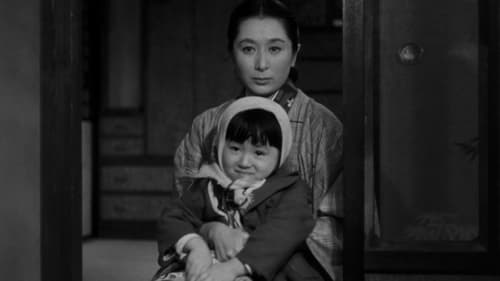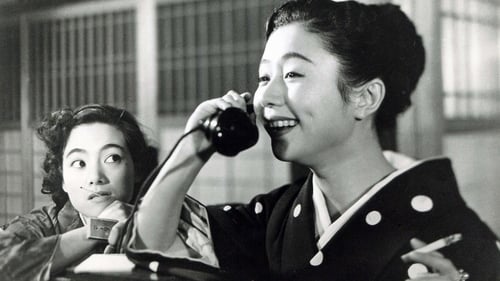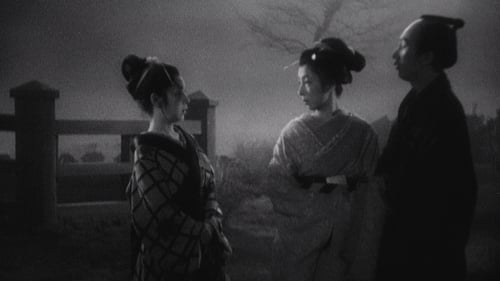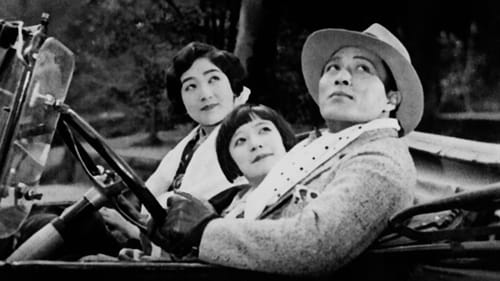Hiroko Kawasaki
출생 : 1912-04-05, Daishi-cho, Kawasaki, Kanagawa, Japan
사망 : 1976-06-03

Tatsuko
두 아이의 어머니인 후미코는 지금까지 가정에 충실한 삶을 살아왔다. 하지만 시인이 되고 싶다는 마음을 품은 채 후미코는 계속해서 시를 쓴다. 그런 후미코에게 또다른 기회가 찾아오려고 할 때, 후미코는 남편의 불륜과 유방암이라는 고난을 맞는다. 여성 극작가로 활발하게 활동한 다나카 스미에(1908~2000)와 다나카 기누요의 협업이 빛나는 작품.

An Inn at Osaka, rarely seen outside Japan, follows the story of an insurance company executive from Tokyo, Mr. Mito, who is demoted to the Osaka office. He takes a room at a small inn and tries to rebuild his life. Notable for its exquisite framing and cinematography, An Inn at Osaka allows its complicated plotlines to disappear behind the minutiae of penury and humiliation that Mito and others suffer during the post-war economic and social reconstruction.

Osen
Five women classmates from a college in Tokyo are on the first stretch of a walking tour when one of them, Masako, falls ill at a railway station. Osen, a middle-aged maid from a nearby inn, takes her in and nurses her, assisted by Dr. Minami, a young physician who diagnoses her illness as a mild case of pneumonia. With Masako in good hands and needing a few days to recuperate, her classmates continue their tour. Masako’s recovery, however, is hampered by her spoiled and immature nature and her determination to punish the world for the loss of her mother.

Oran
가노파의 세이노스케는 이름난 우키요에 화가 우타마로에게 격분한다. 그러나 세이노스케는 자신의 그림을 몇 번의 붓질로 다른 그림으로 바꿔 버린 우타마로의 재능에 탄복하고, 그의 제자가 되기로 한다. 그런 세이노스케를 찾아갔던 가노의 딸 유키에는 유곽의 창부를 보고는 돌아가 버린다. 한편, 그림을 그리며 창부들과 어울리던 우타마로는 벌을 받아 그림을 그리지 못하게 된다. 관능적인 미인도로 유명한 에도 시대의 우키요에 화가 기타가와 우타마로의 삶을 소재로 한 작품.

Inoue was something of a rarity in the sense, that he was a Shochiku house director who seems to have worked mostly in period films, often with big stars like Hasegawa or Bando. "Sumidagawa", named after the river that runs through Tokyo, is also a period film, but thematically a modern one. All the themes that you associate with the normal Shochiku women's films set in the present day are in this film, just in a different context: love, the planning of a marriage, career, family relations and societal melancholy. There is no action or swordplay.

Okiku
이부세 마스지의 유머 넘치는 원작을 시미즈 히로시가 세련되게 연출해낸 우아한 멜로드라마. 미노부 산을 찾는 참배객들로 늘 번화한 시모베 온천의 여관. 온천에 휴양 온 난무라는 온천욕을 하던 중 머리 장식핀에 발에 상처를 입게 된다. 머리 장식핀 주인인 에미는 이를 사과하기 위해 다시 온천을 찾고 난무라는 그녀를 보자 첫눈에 연심을 품게 된다. 에미는 그가 다시 걸을 수 있을 때까지 곁에 있어 주는데, 난무라의 상처가 다 나아 도쿄로 돌아가고 다른 이들도 떠나지만 에미는 온천에 머문다.

Most of the students studying Ikebana with Kozoe Iemoto are daughters of rich Tokyo families. Kozoe meets and grows close to a doctor who proposes marriage but whose mother harbours ill feeling towards her because of an incident in the mountains where a child got into difficulties. Kozoe rejects the proposal but falls ill and when she recovers, decides to devote herself entirely to the world of flower arranging.

Jie (Michiko Kuwano) attended a women's university with the financial support of her geisha sister Oha (Hiroko Kawasaki) and became a lawyer. The aim. Michiko (Kuniko Miyake), one of the seven best friends from the same women's college, is getting married. The man she's marrying is her sister's lover.

Shizuko
Eiko is an innocent young lady born into a wealthy family with nothing to offer. She was good at singing, and lived her life playing around with her cronies, organizing music concerts and so on. However, things change when her father's business fails and she was suddenly thrown out into the world without any foundation. Eiko has no one to support her after she loses her social status, and her only tutor, Shinnosuke (Natsukawa Daijiro) was the only one who was sincere. Eiko is a stickler for using everything she can get her hands on, and she quickly moves into Shinnosuke's house.

Naomi Tazawa (Hiroko Kawasaki), who works at Isetan Department Store, was told by an executive at a film company (Ken Uehara), that he was going to make a film about her. She was scouted to become an actress, but she held strong. Around that time, her adoptive father dies, and at the time of his death, she learns that her real father was a man of high rank.

A Japanese wartime film directed by Yasushi Sasaki.

Miya Shigisawa
A penniless orphan loses the woman he loves, when her family arranges a marriage to a wealthy playboy. He believes she was blinded by greed, and becomes a miser.

The eldest daughter of a noble family is in love with an aviator while being courted by a fellow aristocrat she thinks is a dullard. Told from the perspective of Ryota. In this second part, we learn that Akemi is pregnant...

The eldest daughter of a noble family is in love with an aviator while being courted by a fellow aristocrat she thinks is a dullard. This part is told from the perspective of Akemi.

The narrative is about a woman who faces hard times, when her husband is arrested for a crime committed by his boss. The woman also has a child to look after, and they end up meeting several colorful personalities.

Bride
This pair of gentle yet witty and inventive comedies from the director of The Neighbour's Wife and Mine typify both the formal experimentation of early Japanese sound cinema and the social milieux that Shochiku tended to depict. 'Virtually plotless, and feeling more like comic sketches than fully developed stories,' writes Arthur Nolletti, Jr, 'these light comedies, or farces, take a wholly trivial matter (often a socially embarrassing situation) and use it as a springboard for a succession of gags.' Much of the films' distinction comes from the wit of Gosho's direction, the imaginative use of the new sound technology and the charm of the acting, particularly of the heroines (Kinuyo Tanaka in Bride; Hiroko Kawasaki in Groom). Yet in both films, Gosho finds room for some shrewd observation of character and environment, subtly exploring the values and assumptions of the suburban petit bourgeoisie.

Living Things a film by Heinosuke Gosho

Kinue Nishimura
The story is centered around the devastating experiences of two villagers, Osaki Shuichi, and his cousin, Nishimiura Kinue, when they leave their hometown for the metropolis of Tokyo. They are in love with each other, but Kinue is expected to marry the lawyer Kanda Seiji. In consequence, Shukichi leaves for Tokyo, where he becomes tutor to the son of the rick Iwaki family. The heartbroken Kinue also makes her way to the capital, where she becomes a bar hostess.

Harue
A young couple is harrased by an uncle.

Sister
A young man falls in love with a prostitute and is disowned by his family. He is then drafted, and heads off to war. Script exists - considered to be a lost film.

Yōzen'in
This 1932 adaptation is the earliest sound version of the ever-popular and much-filmed Chushingura story of the loyal 47 retainers who avenged their feudal lord after he was obliged to commit hara-kiri due to the machinations of a villainous courtier. As the first sound version of the classic narrative, the film was something of an event, and employed a stellar cast, who give a roster of memorable performances. Director Teinosuke Kinugasa was primarily a specialist in jidai-geki (period films), such as the internationally celebrated Gate of Hell (Jigokumon, 1953), and although he is now most famous as the maker of the avant-garde silent films A Page of Madness (Kurutta ichipeji, 1926) and Crossroads (Jujiro, 1928), Chushingura is in fact more typical of his output than those experimental works. The film ranked third in that year’s Kinema Junpo critics’ poll, and Joseph Anderson and Donald Richie noted that 'not only the sound but the quick cutting was admired by many critics.

Yumie
Part two of Shimizu's major silent Seven Seas, a family drama of the intertwining fates of the rich, decadent Yagibashis and the far less prosperous Sone family.

Yumie
The film is a lengthy work interweaving characters from different backgrounds and social strata in a narrative centered around the experiences of its heroine, Yumie Sone. Over two hours long, Seven Seas was released theatrically in two parts, with the first part entitled "Virginity Chapter" coming out in December 1931, while the second part, "Chastity Chapter," followed in March 1932. Near the beginning of the narrative, at a garden party given by the wealthy Yagibashi family in Tokyo, Yumie meets Takehiko, the Yagibashis' playboy son and the brother of Yumie's fiancé, Yuzuru. Yumie, a young middle-class woman, lives with her ailing father, a retired ministry official, an older sister, and a younger sister still a child (played by a very young Hideko Takamine). Takehiko, who has just returned from a trip to Europe, is attracted to Yumie and contrives to have her stay overnight at his family's mansion where he takes advantage of her.

Terue, Soichi's sister
Michiko gets pregnant after a rape. She marries a boring business partner of her father to avoid the shame. Later she meets the rapist again who is now a union leader in opposition of her husband.

Hiroko, Typist
검도 달인인 오카지마는 얼굴의 무성한 수염으로 모르는 사람이 없을 정도로 유명하지만 거칠어 보이는 인상 때문에 취직도 실패하고 여성에게도 인기가 없다. 어느날 불량배들에게 위협당하고 있던 소녀 히로코를 구출해준 오카지마는 히로코의 권유로 수염을 깎아 버린다. 그러자 용모가 수려한 청년으로 변신을 해 취직도 하고 세명의 여성으로부터 프로포즈도 받게된다.

Young woman

Yasue Sugimoto
Kenji is a small-time thief who likes drinking and fighting. When he falls in love with sweet and simple Yazue, and she finds out what kind of guy he really is, she leaves him "until he becomes an honest person." Kenji soon finds it's not easy to get rid of one's past.

The Idiot, by Fyodor Dostoevsky.

Chiyoko - 'Stick Girl'
Short feature by Hiroshi Shimizu.





















